This article was co-authored by Diane Martinez. Diane Martinez is a Certified Holistic Life Coach and Founder of Conscious Creating Life Coaching, LLC in Atlanta, Georgia. Diane has over 10 years of coaching experience and works with clients in person and virtually on a variety of topics including career decisions, family relationships, anxiety, and setting boundaries. Diane earned her Coaching Certification from Alan Cohen's Holistic Life Coach Training Program.
There are 11 references cited in this article, which can be found at the bottom of the page.
This article has been viewed 47,893 times.
Watching television is a common daily pastime. Many homes are equipped with not just one, but several TV units. While this passive activity can be fun and entertaining, it is easy to let TV take over your life. Spending hour upon hour in front of the tube can take time and energy away from more fulfilling activities, as well as taking a toll on your health. Fortunately, by using simple tricks, working to break your habit, and focusing on other activities, you can lessen the time you spend with your TV.
Steps
Using Simple Tricks
-
1Limit your TV viewing to one room. At some point in recent history, it became popular to put televisions in every room of the house. But having access to TV everywhere you turn only leads to unnecessary viewing. Limit your TV watching to one room of your house to reduce temptation and ultimately watch less TV.[1]
-
2Use TiVo or DVR. Using a television recording device, like TiVo or DVR, can allow you to save the TV shows that you like. Having your favorite TV shows saved will reduce the time you spend aimlessly browsing and flipping channels, causing you to watch less TV.[2]Advertisement
-
3Cover your TV when not in use. Keeping your TV in a cabinet (with a door that closes) or simply placing a tapestry over it when it is not in use can lead to a reduction in your TV time. When you can’t see the TV, you are much less likely to turn it on.[3]
-
4Cancel your cable. Many people today are ditching their cable in favor of internet television services, like Netflix or Hulu. Once again, this practice eliminates the ability to mindlessly flip channels and leads to less time in front of the TV.[4]
-
5Unplug your TV when not in use. If you make it more difficult for yourself to watch TV, it gives you a better opportunity to exercise some willpower. One way to achieve this is to unplug your TV when it’s not in use. Keeping your TV plugged in actually wastes quite a bit of energy, so pulling the plug is also a great choice for your pocketbook and the earth.[5]
Breaking the Habit
-
1Track your TV time. You have probably heard that the first step to tackling a problem is to admit that you have one. If you suspect that you might be watching too much television, take a week to prove it. For one week, watch as much television as you normally do, but keep a log. At the end of the week add it up, and astonish yourself with how much time you’ve been wasting in front of the screen.[6]
- Once you have your weekly amount, think about all the other things you could have done with that time.
- It could have been 10 hours studying, 15 hours at the gym, or 20 hours practicing guitar.
-
2Set a daily time limit. One popular tactic is to allow yourself only a certain number of hours (or minutes) of TV time per day. Start by limiting yourself to one hour per day. Then, once you are comfortable with that amount, maybe try to do half an hour per day, or one hour every other day.[7]
-
3Use TV as a reward. Rather than simply giving yourself TV time each day “for free,” you may want to use TV as a reward. For example, if you work out for 45 minutes, maybe this earns you 45 minutes of TV time. If you finish that letter you’ve been meaning to write, maybe this earns you another 15. This way, you’re still getting your hour to unwind in front of the TV, but you’ve also completed some important tasks in the process.[8]
- You may want to create a list that details the number of TV minutes certain tasks are worth.
- You may still want to enforce a daily cap (such as 1-2 hours).
-
4Avoid eating in front of the TV. Eating in front of the television is an addicting habit. Not only has this been shown to have negative effects on your waistline, but it encourages longer and more frequent TV watching. Break the habit! Focus on eating your food when its time to eat, and pay close attention to the TV when it is time for TV.[9]
-
5Use some willpower. You can use any trick in the book, but ultimately your choice to watch less TV is going to come down to willpower. Willpower is like a muscle: the more you exercise it, the stronger it becomes. Watching less television is an important lifestyle adjustment that can have very positive benefits for you. Try to be strong and follow the goals you have set for yourself.[10]
Replacing TV with Other Activities
-
1Exercise. Exercise seems to be the answer to everything, right? Well studies have actually shown that people who exercise regularly have a lowered desire to watch TV! So not only will getting active distract you and give you something else to do, but if you commit to do doing it regularly, it will lessen your TV addiction.[11]
-
2Call a friend. It is common for people to flip on the television anytime that they feel lonely. If you find yourself in this position, turn off the TV and phone a friend instead. That conversation will definitely be more uplifting and better at countering feelings of loneliness than another episode of Mad Men.
-
3Play board games. If you and the people you live with are huddled up around the TV every night, try changing the scene and pull out some board games. Board games can be a lot of fun for people of all ages. Depending on the game, they encourage interaction, cooperation, strategy, critical thinking, and having a sense of humor. Start up a game and then look around: you are sure to see a room full of smiles.[12]
-
4Listen to podcasts. If you really craving some form of passive entertainment, try listening to a podcast. Podcasts exist on almost any subject and in a variety of genres (comedy, storytelling, non-fiction, etc.) But listening to podcasts still helps you reduce your screen-time. Best of all, podcasts are totally portable! You can tune in from your car, the bus, or walking down the street.[13]
- Find podcasts through a podcast app, the iTunes store, or through a basic internet search.
-
5Go to the movies. If you really have the itch to take in some audio-visual entertainment, take yourself to the movies instead of lounging on the couch. Going to the movies is a great way to get out of the house, it’s a fun activity to do on a date or with a friend, and it creates a much more immersive experience than watching TV at home. Plus, a movie is presented in a limited quantity: you’ll only watch those 90 (or so) minutes, and then you’ll be done.
Expert Q&A
-
QuestionHow can I stop watching TV while studying?
 Diane MartinezDiane Martinez is a Certified Holistic Life Coach and Founder of Conscious Creating Life Coaching, LLC in Atlanta, Georgia. Diane has over 10 years of coaching experience and works with clients in person and virtually on a variety of topics including career decisions, family relationships, anxiety, and setting boundaries. Diane earned her Coaching Certification from Alan Cohen's Holistic Life Coach Training Program.
Diane MartinezDiane Martinez is a Certified Holistic Life Coach and Founder of Conscious Creating Life Coaching, LLC in Atlanta, Georgia. Diane has over 10 years of coaching experience and works with clients in person and virtually on a variety of topics including career decisions, family relationships, anxiety, and setting boundaries. Diane earned her Coaching Certification from Alan Cohen's Holistic Life Coach Training Program.
Certified Holistic Life Coach Make the decision to do it and stick with it! If you allow room for negotiation in your mind, you're forfeiting the power to make a choice that will bring you towards your goals. It can help to set a timer—you might turn the TV off and set a timer for 35 minutes of non-stop studying. Then, after the timer goes off, let yourself watch TV for 20 minutes while you're studying. When you approach studying with this method, you'll be able to stick with it since you know there's a finite end.
Make the decision to do it and stick with it! If you allow room for negotiation in your mind, you're forfeiting the power to make a choice that will bring you towards your goals. It can help to set a timer—you might turn the TV off and set a timer for 35 minutes of non-stop studying. Then, after the timer goes off, let yourself watch TV for 20 minutes while you're studying. When you approach studying with this method, you'll be able to stick with it since you know there's a finite end.
Warnings
- You might actually become more interesting if you do more things other than watching TV. Be aware that people find that attractive.⧼thumbs_response⧽
Things You'll Need
- DVR or TiVo
- Hobbies
- Music
- Friends
References
- ↑ http://www.becomingminimalist.com/how-to-limit-your-childs-screen-time/
- ↑ http://www.marketingcharts.com/television/are-young-people-watching-less-tv-24817/
- ↑ http://www.webmd.com/parenting/raising-fit-kids/recharge/kids-screen-time?page=2
- ↑ http://www.lifehack.org/articles/featured/6-steps-to-remove-tv-from-your-life.html
- ↑ http://www.motherjones.com/blue-marble/2012/05/unplug-6-gadgets-lower-electricity-bill
- ↑ http://www.michaeldpollock.com/how-i-overcame-tv-addiction/
- ↑ http://www.lifehack.org/articles/featured/6-steps-to-remove-tv-from-your-life.html
- ↑ https://www.empoweringparents.com/article/screen-time-using-technology-as-a-consequence-or-reward-for-your-child/
- ↑ http://www.medicaldaily.com/distracted-eating-front-your-tv-or-your-phone-makes-you-fat-more-likely-snack-later-336438
About This Article
It can be hard to cut back on how much TV you watch, but if you want to regain some of your free time, it’s possible! Set your DVR to record your very favorite shows. Then, set a time limit for how many shows you can watch each day. When you’re not using your TV, unplug it or hide it behind a cabinet with a closed door. In addition, avoid eating in front of the TV, since this can encourage longer and more frequent TV watching. Read on for tips from our reviewer on canceling cable to help you watch less TV!
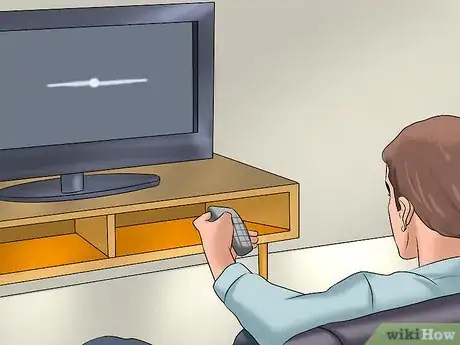

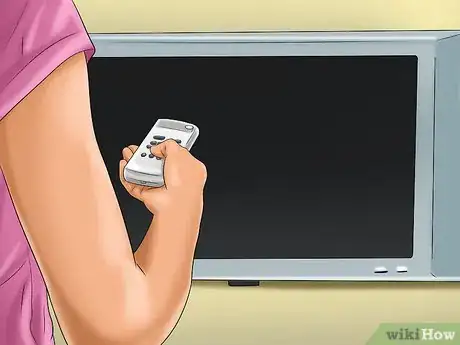
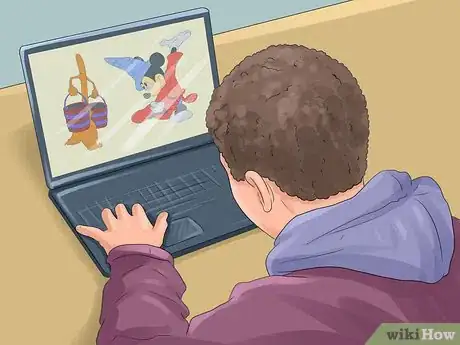


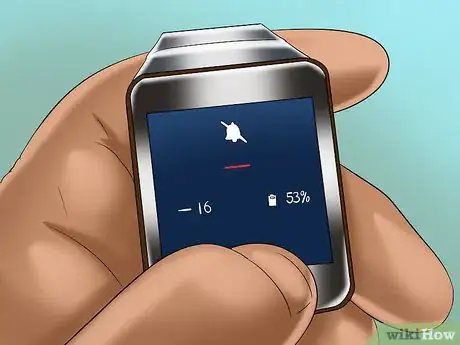


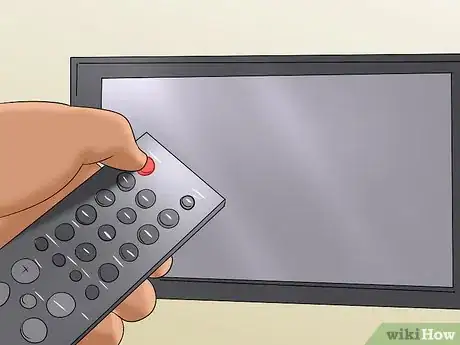

















-Step-17.webp)









































